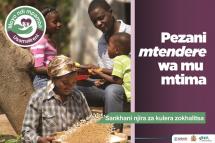Support for Service Delivery Integration (SSDI) Malawi
In 2011, USAID Malawi awarded the five year, US $100 million Support for Service DeliveryIntegration (SSDI) Project, consisting of three separate, but interrelated Cooperative Agreements:
- SSDI-Services
- SSDI-Systems
- SSDI-Communication
SSDI Services works withthe Government to achieve improved service delivery; SSDI Systems to improve policies, management and leadership; and SSDI Communication to support social and behavior change communication (SBCC).
SSDI-Communication was implemented by JHU/CCP in collaboration with Save the Children. SSDI-Communication developed and disseminated behavior change communication materials on 6six priority health areas- family planning and reproductive health, malaria, HIV/AIDS, maternal, neonatal and child health, nutrition, and WASH, all under the Moyo ndi Mpamba (Life is Precious) campaign.
SSDI supported the Government of Malawi to achieve its vision of improving the health status of all Malawians. The goal of SSDI is to support, in partnership with the Ministry of Health, effective integration and delivery of quality services under the Expanded Health Promotion (EHP) initiative, and to strengthen the national health system in line with the HSSPII.
The EHP promotes the provision of a basic, cost-effective package of promotive, preventive,curative and rehabilitative health services determined on the basis of scientific and practicalexperience in service delivery and its ability to have a significant impact on the health statusof the majority of people in Malawi.SSDI was guided by the principles of country ownership and leadership, integration for greater efficiency, and building on existing systems and past achievements. SSDI focuses on a comprehensive program of support in 15 districts (Nsanje, Phalombe, Chikhwawa, Machinga,Mangochi, Mulanje, Balaka, Zomba, Salima, Nkhotakota, Dowa, Kasungu, Lilongwe, Chitipaand Karonga) located in each of the country’s five health zones. This five-year project (October1, 2011-September 30, 2016) has the central theme,‘Together we build healthy families’.
Source: Johns Hopkins Center for Communication Programs
Date of Publication: December 8, 2020
SIMILIAR RESOURCES
Tools
Examples
- MULTI-SBC: The Programmatic Aid for Multi-Sectoral Integration of SBC for FP Practitioners
- Using Data to Design an Evidence-based Social and Behavior Change Program in Rural Nepal
- The Behavior Change Framework
- La Planification Familiale dans les Situations d'Urgence: Essentielle,, Voulue, Necessaire et Realisable
- Barrier Analysis Questionnaires
- HIV and Sexual and Reproductive Health Programming: Innovative Approaches to Integrated Service Delivery
- Integrated SBCC Programs: Key Challenges and Promising Strategies - Webinar
- Advocating for Social Marketing Programs to Local Stakeholders
- Moving the Needle on Health Behaviors
- SBCC for Malaria in Pregnancy: Strategy Development Guidance

